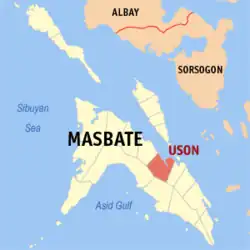Uson
Uson, officially the Municipality of Uson, is a 3rd class municipality in the province of Masbate, Philippines. According to the 2020 census, it has a population of 57,166 people.[3]
Uson | |
|---|---|
| Municipality of Uson | |
 Beach and Mangroves of Uson | |
 Flag | |
 Map of Masbate with Uson highlighted | |
OpenStreetMap | |
.svg.png.webp) Uson Location within the Philippines | |
| Coordinates: 12°13′31″N 123°47′00″E | |
| Country | Philippines |
| Region | Bicol Region |
| Province | Masbate |
| District | 3rd district |
| Barangays | 35 (see Barangays) |
| Government | |
| • Type | Sangguniang Bayan |
| • Mayor | Salvadora O. Sanchez |
| • Vice Mayor | Felipe U. Sanchez |
| • Representative | Wilton T. Kho |
| • Municipal Council | Members |
| • Electorate | 34,832 voters (2022) |
| Area | |
| • Total | 163.20 km2 (63.01 sq mi) |
| Elevation | 31 m (102 ft) |
| Highest elevation | 253 m (830 ft) |
| Lowest elevation | 0 m (0 ft) |
| Population (2020 census)[3] | |
| • Total | 57,166 |
| • Density | 350/km2 (910/sq mi) |
| • Households | 12,964 |
| Economy | |
| • Income class | 3rd municipal income class |
| • Poverty incidence | 36.45 |
| • Revenue | ₱ 183.1 million (2020) |
| • Assets | ₱ 548 million (2020) |
| • Expenditure | ₱ 131.4 million (2020) |
| • Liabilities | ₱ 154.5 million (2020) |
| Service provider | |
| • Electricity | Masbate Electric Cooperative (MASELCO) |
| Time zone | UTC+8 (PST) |
| ZIP code | 5402 |
| PSGC | |
| IDD : area code | +63 (0)56 |
| Native languages | Masbateño Tagalog |
It is about 42 kilometres (26 mi) southeast of Masbate City, connected by a paved coastal road, and located on Uson Bay which has an approximate area of 15 square kilometres (5.8 sq mi).
History
Uson was created as a municipality through Executive Order No. 244 signed by President Elpidio Quirino on July 18, 1949.[5]
Geography
The municipality is bounded by the municipality of Mobo on the north with the Balatucan river; on the east Uson is bounded by the Barangay Balocawe of the municipality of Dimasalang; on the south it is bounded by the Baldosa river and Palo Bandera of Cawayan; on the west the municipality is bounded by Milagros.
With and elevation of 604 metres (1,982 ft) above sea level, Mount Uac is the highest point of the municipality. The mountain borders the three municipalities of Uson, Mobo and Milagros.
Uson has several rivers, including Balucaw River, Buenavista River, Buracan River, Calpi River, Dap-dap River, Mongahay River, Pinangapugan (Quezon) River, and the Sawang River which all flow into Uson Bay. East of the poblacion a lake can be found, Lake Calero.
Seismic activity
The Philippine Fault System from which almost all of the recorded strong earthquakes in the Philippines emanated, traverses eastern Uson. As a result, strong seismic activity in the form of frequent earthquakes can be experienced. Link to PHIVOLCS website
Climate
| Climate data for Uson, Masbate | |||||||||||||
|---|---|---|---|---|---|---|---|---|---|---|---|---|---|
| Month | Jan | Feb | Mar | Apr | May | Jun | Jul | Aug | Sep | Oct | Nov | Dec | Year |
| Average high °C (°F) | 29 (84) |
29 (84) |
31 (88) |
32 (90) |
32 (90) |
31 (88) |
30 (86) |
30 (86) |
30 (86) |
30 (86) |
29 (84) |
29 (84) |
30 (86) |
| Average low °C (°F) | 23 (73) |
22 (72) |
23 (73) |
23 (73) |
25 (77) |
25 (77) |
24 (75) |
25 (77) |
24 (75) |
24 (75) |
24 (75) |
23 (73) |
24 (75) |
| Average precipitation mm (inches) | 39 (1.5) |
34 (1.3) |
42 (1.7) |
36 (1.4) |
73 (2.9) |
109 (4.3) |
118 (4.6) |
108 (4.3) |
129 (5.1) |
136 (5.4) |
112 (4.4) |
89 (3.5) |
1,025 (40.4) |
| Average rainy days | 12.6 | 9.7 | 12.0 | 13.0 | 20.5 | 25.3 | 26.2 | 24.8 | 25.2 | 25.9 | 21.9 | 17.9 | 235 |
| Source: Meteoblue[6] | |||||||||||||
Barangays
Uson is politically subdivided into 35 barangays. Each barangay consists of puroks and some have sitios.
- Arado
- Armenia
- Aurora
- Badling
- Bonifacio
- Buenasuerte
- Buenavista
- Campana
- Candelaria
- Centro
- Crossing
- Dapdap
- Del Carmen
- Del Rosario
- Libertad
- Madao
- Mabini
- Magsaysay
- Marcella
- Miaga
- Mongahay
- Morocborocan
- Mabuhay
- Paguihaman
- Panicijan
- Poblacion Uson
- Quezon
- San Isidro
- San Jose
- San Mateo
- San Ramon
- San Vicente
- Santo Cristo
- Sawang
- Simawa
Demographics
|
| ||||||||||||||||||||||||||||||||||||||||||
| Source: Philippine Statistics Authority[7][8][9][10] | |||||||||||||||||||||||||||||||||||||||||||
In the 2020 census, the population of Uson, Masbate, was 57,166 people,[3] with a density of 350 inhabitants per square kilometre or 910 inhabitants per square mile.
Economy
References
- Municipality of Uson | (DILG)
- "2015 Census of Population, Report No. 3 – Population, Land Area, and Population Density" (PDF). Philippine Statistics Authority. Quezon City, Philippines. August 2016. ISSN 0117-1453. Archived (PDF) from the original on May 25, 2021. Retrieved July 16, 2021.
- Census of Population (2020). "Region V (Bicol Region)". Total Population by Province, City, Municipality and Barangay. Philippine Statistics Authority. Retrieved 8 July 2021.
- "PSA Releases the 2018 Municipal and City Level Poverty Estimates". Philippine Statistics Authority. 15 December 2021. Retrieved 22 January 2022.
- "Executive Order No. 244, s. 1949". Official Gazette of the Republic of the Philippines. Archived from the original on 31 January 2023. Retrieved 31 January 2023.
- "Uson: Average Temperatures and Rainfall". Meteoblue. Retrieved 23 June 2020.
- Census of Population (2015). "Region V (Bicol Region)". Total Population by Province, City, Municipality and Barangay. Philippine Statistics Authority. Retrieved 20 June 2016.
- Census of Population and Housing (2010). "Region V (Bicol Region)". Total Population by Province, City, Municipality and Barangay. National Statistics Office. Retrieved 29 June 2016.
- Censuses of Population (1903–2007). "Region V (Bicol Region)". Table 1. Population Enumerated in Various Censuses by Province/Highly Urbanized City: 1903 to 2007. National Statistics Office.
- "Province of Masbate". Municipality Population Data. Local Water Utilities Administration Research Division. Retrieved 17 December 2016.
- "Poverty incidence (PI):". Philippine Statistics Authority. Retrieved December 28, 2020.
- "Estimation of Local Poverty in the Philippines" (PDF). Philippine Statistics Authority. 29 November 2005.
- "2003 City and Municipal Level Poverty Estimates" (PDF). Philippine Statistics Authority. 23 March 2009.
- "City and Municipal Level Poverty Estimates; 2006 and 2009" (PDF). Philippine Statistics Authority. 3 August 2012.
- "2012 Municipal and City Level Poverty Estimates" (PDF). Philippine Statistics Authority. 31 May 2016.
- "Municipal and City Level Small Area Poverty Estimates; 2009, 2012 and 2015". Philippine Statistics Authority. 10 July 2019.
- "PSA Releases the 2018 Municipal and City Level Poverty Estimates". Philippine Statistics Authority. 15 December 2021. Retrieved 22 January 2022.